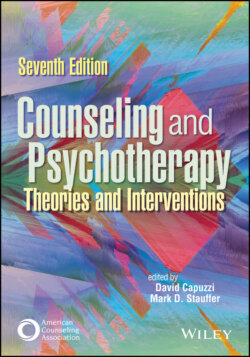Читать книгу Counseling and Psychotherapy - Группа авторов - Страница 34
Respect and Positive Regard
ОглавлениеRespect and positive regard are defined as the belief in each client’s innate worth and potential and the ability to communicate this belief in the helping relationship. This belief, once communicated, provides clients with positive reinforcement relative to their innate ability to take responsibility for their own growth, change, goal determination, decision-making, and eventual problem resolution. It is an empowering process that delivers a message to clients that they are able to take control of their lives and, with facilitative assistance from the counselor or therapist, foster change. Communicating and demonstrating this respect for clients takes many forms. According to Baruth and Robinson (1987), it “is often communicated by what the counselor does not do or say. In other words, by not offering to intervene for someone, one is communicating a belief in the individual’s ability to ‘do’ for himself or herself” (p. 85).
Personal characteristics or behaviors that enhance a counselor’s or therapist’s ability to provide respect and positive regard include, but are not limited to, the following:
The capacity to respect oneself
The capacity to view oneself as having worth and potential
The capacity to model and communicate this positive self-image to clients
The capacity to recognize one’s own control needs, and the ability to use this recognition in a manner that allows clients to direct their own lives
We think it is worth noting, however, that in no type of counseling is it possible for the counselor—a conditioned cultural product—to provide unconditional positive regard unless they are sensitive to the cultural norms of the client (Ibrahim & Dykeman, 2011).
